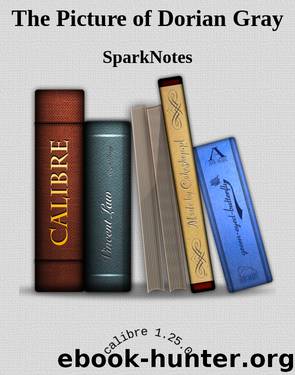The Picture of Dorian Gray by SparkNotes

Author:SparkNotes [SparkNotes]
Language: eng
Format: epub
Published: 0101-01-01T00:00:00+00:00
This testimony is strikingly similar to Dorian’s reflection upon the kind of affection that Basil shows him:
[I]t was really love—[it] had nothing in it that was not noble and intellectual. It was not that mere physical admiration of beauty that is born of the senses, and that dies when the senses tire. It was such love as Michael Angelo had known, and Montaigne, and Winckelmann, and Shakespeare himself.
Basil translates these highly emotional and physical feelings into his art; his act of painting is an expression of his love for Dorian. This romantic devotion to Dorian becomes clear when he admits his reason for not wanting to exhibit the painting: he fears that people will see his “idolatry.”
Dorian reflects, for a moment, that with this love Basil might have saved him from Lord Henry’s influence, but he soon resigns himself to living a life dictated by the pursuit of passion. He devours the mysterious “yellow book” that Lord Henry gives him, which acts almost as a guide for the journey on which he is to travel. Like the protagonist of that novel, Dorian spirals into a world of self-gratification and exotic sensations. Although Wilde, in letters, identified the novel as imaginary, it is based in part on the nineteenth-century French novel À Rebours (“Against the Grain” or “Against Nature”), by Joris-Karl Huysmans, in which a decadent and wealthy Frenchman indulges himself in a host of bizarre sensory experiences. The yellow book has profound influence on Dorian; one might argue that it leads to his downfall. This downfall occurs not because the book itself is immoral (one need only recall the Preface’s insistence that “[t]here is no such thing as a moral or an immoral book”) but because Dorian allows the book to dominate and determine his actions so completely. It becomes, for Dorian, a doctrine as limiting and stultifying as the common Victorian morals from which he seeks escape. After all, Lord Henry is a great fan of the yellow book, but, to his mind, it is no greater or more important than any other work of notable art. He does not let it dominate his life or determine his actions, which, in turn, allows him to retain the respectability that Dorian soon loses.
Download
This site does not store any files on its server. We only index and link to content provided by other sites. Please contact the content providers to delete copyright contents if any and email us, we'll remove relevant links or contents immediately.
| African | Asian |
| Australian & Oceanian | Canadian |
| Caribbean & Latin American | European |
| Jewish | Middle Eastern |
| Russian | United States |
4 3 2 1: A Novel by Paul Auster(12363)
The handmaid's tale by Margaret Atwood(7750)
Giovanni's Room by James Baldwin(7316)
Asking the Right Questions: A Guide to Critical Thinking by M. Neil Browne & Stuart M. Keeley(5751)
Big Magic: Creative Living Beyond Fear by Elizabeth Gilbert(5745)
Ego Is the Enemy by Ryan Holiday(5409)
The Body: A Guide for Occupants by Bill Bryson(5072)
On Writing A Memoir of the Craft by Stephen King(4925)
Ken Follett - World without end by Ken Follett(4718)
Adulting by Kelly Williams Brown(4562)
Bluets by Maggie Nelson(4542)
Eat That Frog! by Brian Tracy(4514)
Guilty Pleasures by Laurell K Hamilton(4437)
The Poetry of Pablo Neruda by Pablo Neruda(4089)
Alive: The Story of the Andes Survivors by Piers Paul Read(4017)
White Noise - A Novel by Don DeLillo(3999)
Fingerprints of the Gods by Graham Hancock(3983)
The Book of Joy by Dalai Lama(3968)
The Bookshop by Penelope Fitzgerald(3841)
